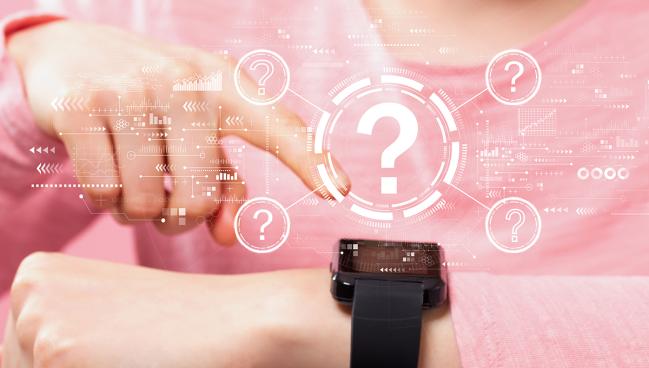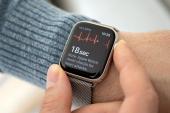No Big Jumps in Smartwatch Accuracy for AF Detection Over Time
The lack of a significant decline in inconclusive readings across devices suggests improvements are needed in the algorithms.

The accuracy of a several popular consumer smart devices for detecting atrial fibrillation (AF) did not improve over a roughly 2-year period despite frequent software updates, the single-center Basel Wearable Study shows.
The proportion of single-lead ECG readings tagged as inconclusive declined numerically over time, but the changes were not statistically significant for any of the five devices: AliveCor KardiaMobile, Apple Watch 6, Fitbit Sense, Samsung Galaxy Watch 3, and Withings ScanWatch.
“To the best of our knowledge, this is the first study assessing the improvement of diagnostic accuracy of algorithm-based AF detection in smart devices over time,” Corinne Isenegger, MD (University Hospital Basel, Switzerland), and colleagues write in a research letter published this week in JACC: Clinical Electrophysiology.
Senior author Patrick Badertscher, MD (University Hospital Basel), said his team decided to look into the accuracy of these devices after noticing some false positives among their patients.
Their study included 247 patients (median age 66 years; 30% women) who underwent electrophysiology procedures at their center between April 6, 2021, and May 31, 2023. Each participant received a 12-lead ECG as well as a single-lead ECG from each of the five smart devices that were evaluated. All devices and associated apps were continuously updated throughout the study period, with the total number of software updates ranging from six (with the Apple Watch) to 26 (with the KardiaMobile and Withings ScanWatch).
Of the 1,235 total single-lead ECG readings, 202 (16%) were labeled as inconclusive by the manufacturers’ algorithms, with that figure ranging from 15% to 19% across devices.
Inconclusive rates declined numerically from the beginning to the end of the study for all five devices—KardiaMobile (14% to 6%), Apple Watch (14% to 6%), Fitbit Sense (20% to 14%), Samsung Galaxy (18% to 10%), and Withings ScanWatch (22% to 14%). However, when the inconclusive rate was examined on a continuous basis, the trends were not statistically significant for any of the devices.
Still, “I believe they will get better, but probably at a slower pace than the industry thinks,” Badertscher said. He noted that when the same single-lead ECGs were read by two cardiologists to look for AF, the inconclusive rate was less than 1%, which indicates it’s likely the algorithms interpreting the readings, and not the ECG technology itself, that need to improve.
Prior work by his group has shown that an external algorithm applied to single-lead ECGs can outperform smartwatches, demonstrating “that there’s room for improvement, and I think it will be possible.”
In the meantime, there remain questions about what role these types of devices will play in the clinical management of AF. A big challenge, Badertscher said, is that many of the people who wear smartwatches are younger. “So basically you perform a screening for atrial fibrillation in a patient population that is not really at risk,” he said. “If you use the smartwatches in a patient population above the age of 65 that has more risk factors, then probably it would be even more useful.”
Specific patient groups in which using one of these devices to monitor for arrhythmias could be useful include those with palpitations or paroxysmal supraventricular tachycardia, who will then have ECG documentation of their abnormal rhythms, and those who want to watch for AF after catheter ablation or a stroke, Badertscher suggested.
These devices are not yet commonly integrated into clinical practice, but that will likely change in the coming years, he predicted. “More and more people will acquire some sort of wearable. Most of them are equipped with single-lead ECG technology, so we will get confronted with these tracings and it’s now our task to find ways to integrate them in our care in a meaningful way.”
Todd Neale is the Associate News Editor for TCTMD and a Senior Medical Journalist. He got his start in journalism at …
Read Full BioSources
Isenegger C, Mannhart D, Arnet R, et al. Accuracy of smartwatches for atrial fibrillation detection over time: insights from the Basel Wearable Study. J Am Coll Cardiol EP. 2024;Epub ahead of print.
Disclosures
- This research received funding from the Swiss Heart Foundation, University of Basel.
- Badertscher reports having received research funding from the University of Basel, the Stiftung für Herzschrittmacher und Elektrophysiologie, the Freiwillige Akademische Gesellschaft Basel, the Swiss Heart Foundation, and Johnson & Johnson; and having received personal fees from BMS, Boston Scientific, and Abbott, all outside the submitted work.
- Isenegger reports no relevant conflicts of interest.





Comments